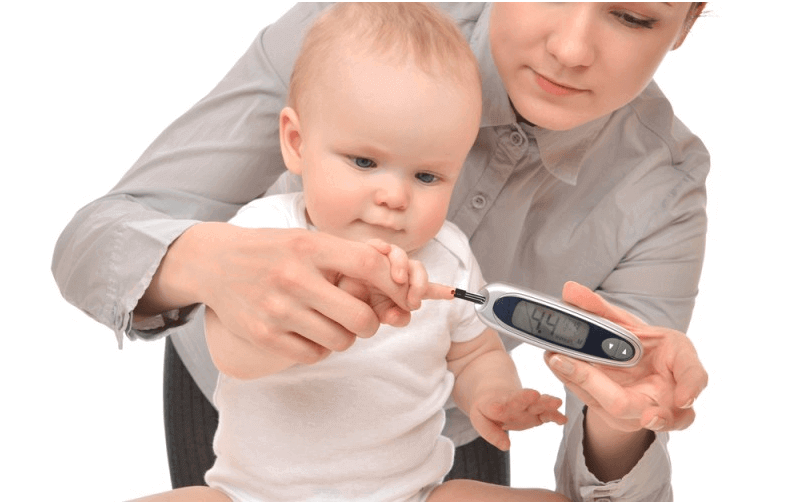Diabetes in children associated with genetic and autoimmune factors
Diabetes, also known as diabetes, is a term that reflects a disorder in the body's ability to convert food into energy.
1. What is diabetes in children?
When you take in a carbohydrate, your body converts it into a sugar called glucose and sends it to the bloodstream. Your pancreas releases insulin, a hormone that helps move glucose from your blood into your cells, where it creates energy for your body's activities.
When you have diabetes, your body will not be able to use insulin as it should, leading to too much glucose remaining in the blood leading to high blood sugar.
Although it has been studied a lot, so far there is no cure for diabetes. However, with treatment and lifestyle changes, you can live a long, healthy life.
Diabetes has different forms, depending on the cause, of which there are 2 main types: type 1 and type 2 diabetes.
Childhood diabetes, also known as childhood diabetes, is the most common type 1 diabetes.
1.1 What is prediabetes? Prediabetes is when your blood sugar is higher than it should be but not high enough for your doctor to conclude that you have diabetes.
Prediabetes can make you more likely to develop type 2 diabetes and heart disease. Exercising more and losing weight, even if you just lose 5% to 7% of your body weight, can greatly reduce those risks.
1.2 Type 1 Diabetes Type 1 diabetes is an autoimmune condition. It happens when your body attacks your pancreas with antibodies that damage it and stop it making insulin.
Type 1 diabetes is treated by injecting insulin into the fatty tissue just under the skin. If you have type 1 diabetes, you will need to get used to a number of changes including:
Check your blood sugar regularly Get a careful diet Exercise daily Take insulin and other other medications as needed.

Tiêm Insulin giúp điều trị bệnh tiểu đường
1.3 Type 2 Diabetes Type 2 diabetes used to be called non-insulin dependent diabetes or geriatric diabetes. About 90% of people with diabetes have type 2 diabetes.
Type 2 diabetes is usually milder than type 1. But it can still cause major health complications, especially in the small blood vessels in kidneys, nerves and eyes. Type 2 also increases the risk of heart disease and stroke.
Treatment for type 2 diabetes involves maintaining a healthy weight, eating right, and exercising. Some people need medication to help.
2. Is diabetes hereditary?
Type 1 diabetes is a common form of diabetes in children. Genetic factors play an important role in type 1 diabetes; genes that influence each stage of disease development. But that's not entirely the main reason. Because the disease also depends on the combination of natural factors and nurture factors.
Your environment, the way you grew up to the foods you ate, also plays an important part.
3. What percentage of you have diabetes?
If you are a father with type 1 diabetes, your child has about a 1 in 17 chance of developing type 1 diabetes in their lifetime.
For mothers with type 1 diabetes having a baby:
If the mother has diabetes before the age of 25, the child has a 1/25 chance. If the mother has diabetes at age 25 or older, the baby has a 1 in 100 chance, which is the same as the risk in the average person.

Cha mẹ mắc bệnh tiểu đường thì con cái cũng có khả năng mắc bệnh
A few other factors can increase a child's risk of developing diabetes:
If a parent has diabetes before the age of 11, the child's risk doubles. If both parents have diabetes, the child's risk can be increased to one in four. If a parent also has a condition called polycythemia vera type 2 syndrome, their child has a 50% chance of developing type 1 diabetes. In case, your parents don't have diabetes but your brother or sister has, you will have about 5% chance of developing type 1 diabetes. The same is true if you have a parent with diabetes. However, if the case is twins, then your odds of getting the disease can be as high as 50%.
Vinmec International General Hospital currently has a Cardiovascular and Diabetic Screening Package with the following outstanding advantages:
Performed by a team of medical-physicians who are leading experts, highly qualified, dedicated and wholeheartedly for the benefit of the patient. With 90% having university degrees, 20% being professors and associate professors, nearly 30% having doctorate degrees, bringing high efficiency in medical examination and treatment. Comprehensive and professional medical examination, consultation and treatment services. The system of modern equipment, supports effective diagnosis and treatment. Modern, civilized, luxurious and sterile medical examination and treatment space. All questions need to be answered by a specialist doctor as well as customers who need examination and treatment at Vinmec International General Hospital, Things to know about autoimmune disease treatment
Reference source: webmd.com
Để đặt lịch khám tại viện, Quý khách vui lòng bấm số HOTLINE hoặc đặt lịch trực tiếp TẠI ĐÂY. Tải và đặt lịch khám tự động trên ứng dụng MyVinmec để quản lý, theo dõi lịch và đặt hẹn mọi lúc mọi nơi ngay trên ứng dụng.
SEE MORE
Detailed distinction of type 1 and type 2 diabetes according to the guidelines of the Ministry of Health New breakthrough in the treatment of diabetes Diabetic patients should receive these vaccines every year
Detailed distinction of type 1 and type 2 diabetes according to the guidelines of the Ministry of Health New breakthrough in the treatment of diabetes Diabetic patients should receive these vaccines every year
Bài viết này được viết cho người đọc tại Sài Gòn, Hà Nội, Hồ Chí Minh, Phú Quốc, Nha Trang, Hạ Long, Hải Phòng, Đà Nẵng.






